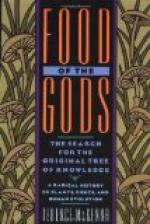[Illustration—Black and White Plate: Cacao Crop, Trinidad.]
The carbohydrates, producing warmth and fat, are also important food substances, the proportion of which, while forming about a fifth of the whole bean, rises to close upon a third of the essence.
Cocoa also contains a volatile oil, from which it derives its peculiar and delicious aroma.
Thus nearly nine-tenths of the cacao-bean may be assimilated by the digestive organs, while three-fourths of tea and coffee are thrown away as waste. For the same bulk, therefore, cocoa is said to yield thirteen times the nutriment of tea, and four and a half times that of coffee. Its value as a substitute for mother’s milk has already been alluded to, but may well be emphasized by a quotation from a paper read before the Surgical Society of Ireland in 1877 by one of its Fellows, Mr. Faussett:
“Without presuming to pass any judgment on the many artificial substitutes which, on alleged chemical and scientific principles, have from time to time been pressed forward under the notice of the profession and the public to take the place of mother’s milk, I beg to call attention to a very cheap and simple article which is easily procurable—viz., cocoa, and which, when pure and deprived of an excess of fatty matter, may safely be relied on, as cocoa in the natural state abounds in a number of valuable nutritious principles, in fact, in every material necessary for the growth, development, and sustenance of the body.”
After giving some remarkable cases of children being restored from “the last stage of exhaustion” by its use, and “continued through the whole period of infancy,” with the effect of their becoming fine, healthy children, he concluded by saying:
“I beg therefore respectfully to commend cocoa, as an article of infant’s food, to the notice of my professional brethren, especially those who, holding office under the Poor Laws, have such large and extensive opportunities of testing its value.”
As a beverage for mothers or nurses cocoa is recommended by Dr. Milner Fothergill, in his work on “The Food we Eat,” in preference to porter, stout or ale, an opinion now becoming generally adopted. It may, therefore, be regarded as the indispensable, all-round nursery food, if not the constant stand-by of the family.
That it is as nutritious for old as well as young we have an interesting proof in the fact that the first Englishman born in Jamaica, Colonel Montague James, who lived to the age of 104, took scarcely any food but cocoa and chocolate for the last thirty years of his life. For athletes and all who desire the development of the muscular tissues, its use is most beneficial. Professor Cavill, in his celebrated swim from Southampton to Portsmouth, and his nearly successful attempt to swim across the English Channel, considered it to be the most concentrated and sustaining food he could use for that trying test of endurance.




